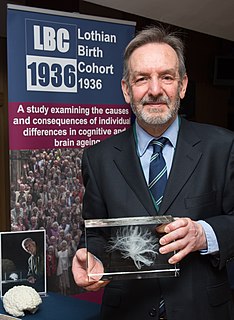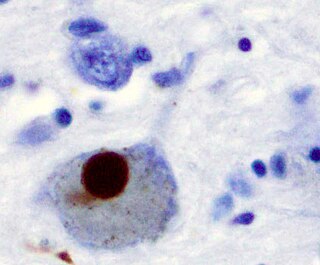Related Research Articles

Dementia occurs as a set of related symptoms when the brain is damaged by disease. The symptoms involve progressive impairments to memory, thinking, and behavior, that affect the ability to perform everyday activities. Other common symptoms include emotional problems, difficulties with language, and decreased motivation. Dementia is not a disorder of consciousness, and consciousness is not usually affected. A diagnosis of dementia requires a change from a person's usual mental functioning, and a greater cognitive decline than that due to normal aging. Several diseases, and injuries to the brain such as a stroke, can give rise to dementia. Dementia has a significant effect on the individual, relationships and caregivers. In DSM-5, dementia has been reclassified as a major neurocognitive disorder, with varying degrees of severity, and many causative subtypes.

Dementia with Lewy bodies (DLB) is a type of dementia accompanied by changes in sleep, behavior, cognition, movement, and autonomic bodily functions. Memory loss is not always an early symptom. The disease worsens over time and is usually diagnosed when cognitive decline interferes with normal daily functioning. Together with Parkinson's disease dementia, DLB is one of the two Lewy body dementias. It is a common form of dementia, but the prevalence is not known accurately and many diagnoses are missed. The disease was first described by Kenji Kosaka in 1976.
Lewy body dementias describe two similar common dementias that are characterized by changes in thinking, movement, behavior, and mood. They are dementia with Lewy bodies (DLB), and Parkinson's disease dementia (PDD).

Rapid eye movement sleep behavior disorder or REM behavior disorder (RBD) is a sleep disorder in which people act out their dreams. It involves abnormal behavior during the sleep phase with rapid eye movement (REM) sleep. The major feature of RBD is loss of muscle atonia during otherwise intact REM sleep. REM sleep is the stage of sleep in which most vivid dreaming occurs. The loss of motor inhibition leads to a wide spectrum of behavioral release during sleep. This extends from simple limb twitches to more complex integrated movement. These behaviors can be violent in nature and in some cases will result in injury to either the individual or their bedmates.

Lewy bodies are the inclusion bodies – abnormal aggregations of protein – that develop inside nerve cells affected by Parkinson's disease (PD), the Lewy body dementias, and some other disorders. They are also seen in cases of multiple system atrophy, particularly the parkinsonian variant (MSA-P).

Ian John Deary OBE, FBA, FRSE, FMedSci is a Scottish psychologist known for work in the fields of intelligence, cognitive ageing, cognitive epidemiology, and personality.
Parkinson-plus syndromes (PPS) is a group of neurodegenerative diseases featuring the classical features of Parkinson's disease with additional features that distinguish them from simple idiopathic Parkinson's disease (PD). Some consider Alzheimer's disease to be in this group. Parkinson-plus syndromes are either inherited genetically or occur sporadically.
John Quinn Trojanowski, M.D., Ph.D. is an academic research neuroscientist specializing in neurodegeneration. He and his partner, Virginia Man-Yee Lee, MBA, Ph.D., are noted for identifying the roles of three proteins in neurodegenerative diseases: tau in Alzheimer's disease, alpha-synuclein in Parkinson's disease, and TDP-43 in Amyotrophic Lateral Sclerosis (ALS) and frontotemporal degeneration.
Jeffrey Lee Cummings is an American professor of neurology at the UCLA.
Maria Grazia Spillantini, is Professor of Molecular Neurology in the Department of Clinical Neurosciences at the University of Cambridge. She is most noted for identifying the protein alpha-synuclein as the major component of Lewy bodies, the characteristic protein deposit found in the brain in Parkinson's disease and dementia with Lewy bodies. She has also identified mutations in the MAPT gene as a heritable cause for frontotemporal dementia.
Kenji Kosaka is a Japanese psychiatrist, known for his pioneer research on Dementia with Lewy bodies (DLB), which he first described.

Synucleinopathies are neurodegenerative diseases characterised by the abnormal accumulation of aggregates of alpha-synuclein protein in neurons, nerve fibres or glial cells. There are three main types of synucleinopathy: Parkinson's disease (PD), dementia with Lewy bodies (DLB), and multiple system atrophy (MSA). Other rare disorders, such as various neuroaxonal dystrophies, also have α-synuclein pathologies.
Tara Spires-Jones, is professor of neurodegeneration and deputy director of the Centre for Discovery Brain Sciences at the University of Edinburgh. She is also programme lead of the UK Dementia Research Institute.

Philip Scheltens is a Dutch professor of neurology and Director of the Alzheimer Centre, VU University Medical Center Amsterdam.

Clive Ballard is a British, world-leading expert in dementia. He is currently Professor of Age-Related Diseases at the University of Exeter and Pro-Vice-Chancellor and Executive Dean of the University of Exeter Medical School.
Parkinson's disease dementia (PDD) is dementia that is associated with Parkinson's disease (PD). Together with dementia with Lewy bodies (DLB), it is one of the Lewy body dementias characterized by abnormal deposits of Lewy bodies in the brain.
The Dementia with Lewy Bodies Consortium is an international multidisciplinary collaboration of researchers interested in the dementia with Lewy bodies. It first convened in Newcastle upon Tyne, England in October 1995. Between 1995 and 2005, it issued three DLBC Consensus Reports on dementia with Lewy bodies.
Corticobasal syndrome (CBS) is a rare, progressive atypical Parkinsonism syndrome and is a tauopathy related to frontotemporal dementia. CBS is typically caused by the deposit of tau proteins forming in different areas of the brain.
In medicine, the cingulate island sign is a finding on FDG-PET brain scans that metabolism in the posterior cingulate cortex is preserved. It can help to identify dementia with Lewy bodies and distinguish it from Alzheimer's disease and other dementias.
The Lewy Body Dementia Association (LBDA) is a US nonprofit organization based in Lilburn, Georgia and "dedicated to raising awareness of the Lewy body dementias (LBD), supporting people with LBD, their families and caregivers and promoting scientific advances".
References
- 1 2 "Professor Ian McKeith". Institute of Neuroscience. Newcastle University. Retrieved 14 May 2020.
- 1 2 "International conference a huge success". Lewy Body Dementia Association. Archived from the original on 20 April 2018. Retrieved 19 April 2018.
- ↑ Brown, Michael (10 August 2015). "Pioneering Newcastle University professor Ian McKeith given lifetime achievement award". ChronicleLive UK. Retrieved 13 April 2018.
- ↑ "New diagnostic criteria published for DLB". Lewy Body Dementia Association. Retrieved 10 April 2018.
- ↑ McKeith IG, Boeve BF, Dickson DW, et al. (July 2017). "Diagnosis and management of dementia with Lewy bodies: Fourth consensus report of the DLB Consortium". Neurology (Review). 89 (1): 88–100. doi:10.1212/WNL.0000000000004058. PMC 5496518 . PMID 28592453.
- ↑ "About us". Lewy Body Society. Archived from the original on 16 June 2018. Retrieved 14 May 2020.